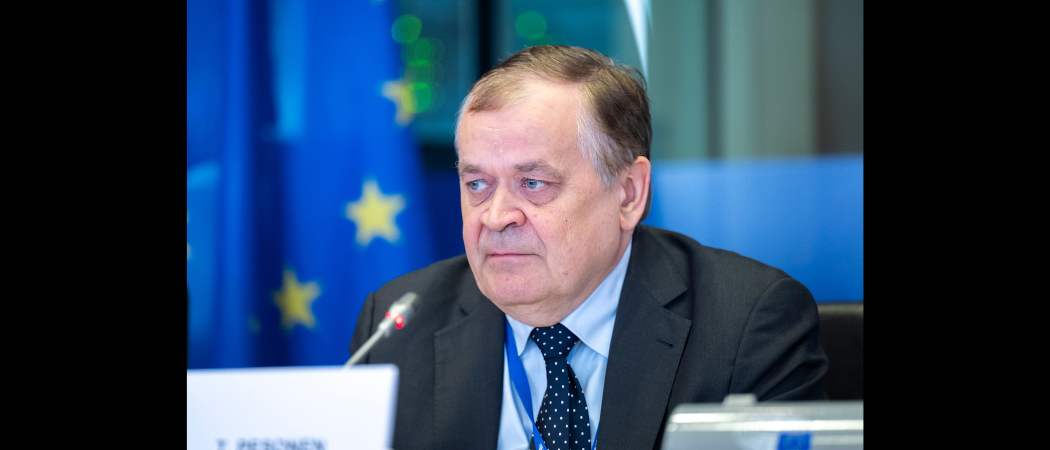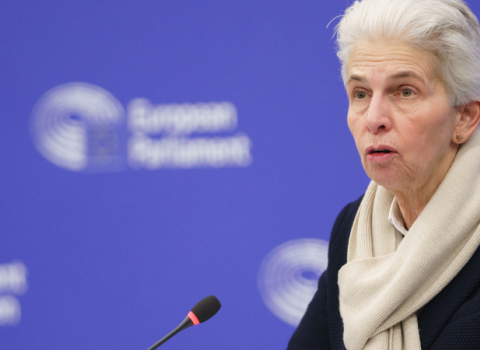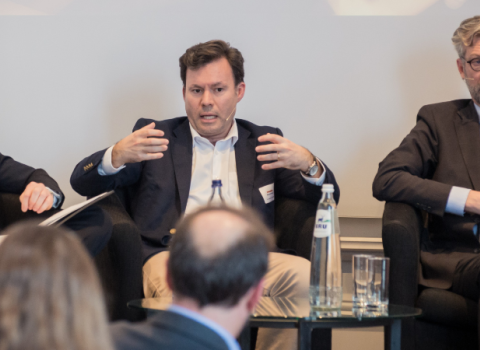The European Defence Fund was set up to support research and development, but it could be rolled into the proposed defence industrial programme, Timo Pesonen, director general for Defence Industry and Space, told MEPs

Timo Pesonen, Director-General for Defence Industry and Space (DEFIS), on Defence Strategy and the EDIP proposal during ITRE committee on Wednesday. Emilie Gomez / European Union
The European Defence Fund (EDF) could in future be integrated into an overarching defence programme, Timo Pesonen, director general for Defence Industry and Space, told members of the European Parliament’s industry (ITRE) committee on Wednesday.
Pesonen was being quizzed by MEPs about the Commission’s proposal for the EU’s first ever European Defence Industrial Strategy (EDIS), announced on 5 March. EDIS sets member states the target of procuring at least 50% of their defence equipment from within the EU by 2030.
A key aspect of the strategy is the proposed European Defence Industry Programme (EDIP). This brings together and extends short-term emergency measures such as the Act in Support of Ammunition Production (ASAP) and the European Defence Industry Reinforcement through common Procurement Act (EDIRPA).
“In the future, when we come with new proposals, it would make sense to put together the EDF, EDIRPA and ASAP logic, and to have one comprehensive programme for the support of the European defence industry,” Pesonen said.
EDF invests more than €1 billion every year in cross-border research and innovation. Around 20% of the funding has so far been allocated to SMEs. “This is a trend we want to pursue in the future, supporting innovation and competitiveness,” Pesonen told the committee.
Pesonen was not questioned on the Commission’s plans to open Horizon Europe up to dual-use technologies with both civil and military applications, but he was asked whether there are plans to improve European research to avoid dependencies on third countries.
“Europe’s competitiveness in industry altogether, and in defence and space industry specifically, can only start by the fact we invest in the early phase in R&D innovation,” he said.
Clarifying the 50% procurement objective, Pesonen said the ASAP and EDIRPA programmes are more flexible due to the urgency of the war in Ukraine, but for the permanent instrument, the Commission will refer to the stricter made-in-Europe criteria of the EDF. “In that way we can mobilise support for the development of European technologies,” he said.
Ambition vs needs
ITRE members were largely supportive of the Commission’s strategy, but called on it to go further. “This industrial plan comes late and doesn’t have enough ambition when you look at our needs. But better late than never,” said Carlos Zorrinho of the S&D group.
“On the joint spending front, and further integration of national defence product procurement policies, more ambition is needed on a European level,” said Ville Niinistö of the Greens/EFA.
Niinistö welcomed the plan, but also warned of the risk that military policies could undermine civilian programmes. “It would be better to spend more money on defence openly - as defence spending - and not take money, for example, away from Horizon Europe or Green Deal investments,” he said.
MEPs relayed the struggles defence companies have in raising capital because of strict taxonomy regulations. Member states have also called for clarity on the definition of sustainable investments, and Pesonen was clear in his message to the finance industry.
“There is no reason to discriminate against the defence industry on the basis of environmental or social sustainability,” he said. “It is an industry that brings jobs and growth to all of us, there is nothing socially unsustainable.”
The Commission’s strategy calls upon the European Investment Bank to change its lending policy by the end of this year, so it can support dedicated military projects not only those that are dual-use. Pesonen said this will be “an important signal” for private investors.
“When the EIB as a European bank does not treat defence differently than other industries, then banks and investors should follow suit,” he said.
Last week, 14 member states sent a letter to the EIB to reconsider its defence lending policy.





 A unique international forum for public research organisations and companies to connect their external engagement with strategic interests around their R&D system.
A unique international forum for public research organisations and companies to connect their external engagement with strategic interests around their R&D system.